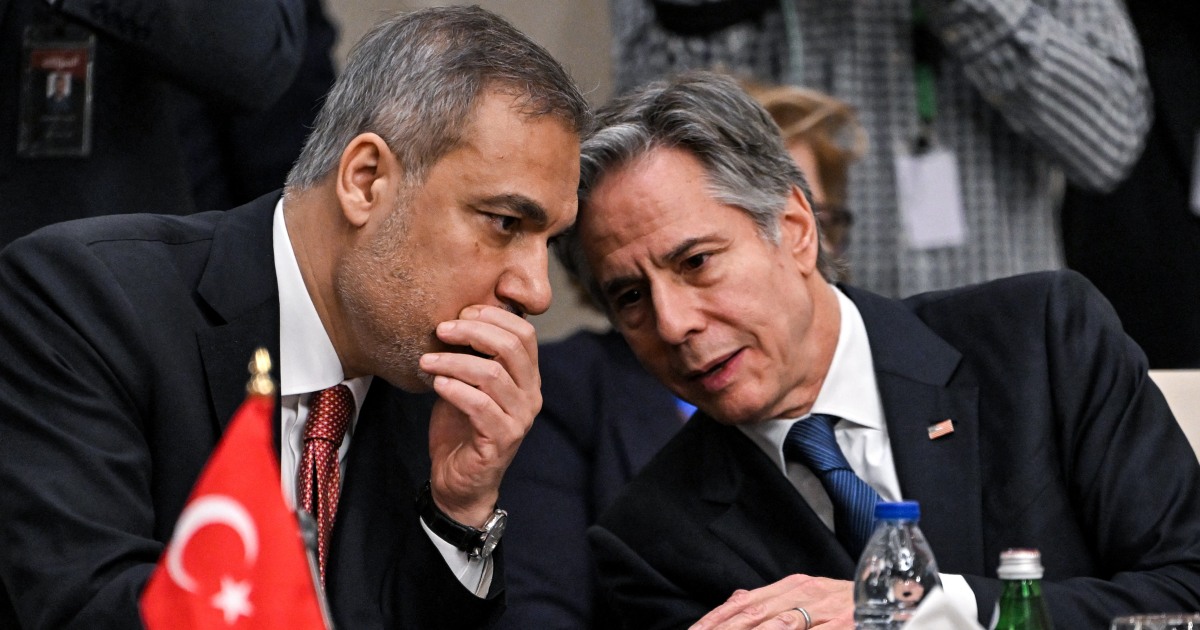U.S. Secretary of State Antony Blinken said Saturday that the U.S. has made direct contact with Syria’s Hayat Tahrir Al-Sham (HTS) rebels, as they transition from a militant insurgency toward a more legitimate governing authority.
“We’ve been in contact with HTS and with other parties,” Blinken said after talks in Aqaba, Jordan, with diplomats and representatives from several Arab nations.
The U.S. designates HTS a terrorist organization, making it legally impossible to work with the group, but contact underscores ongoing efforts to change that designation as the U.S. and its allies look to support Syria’s transition from Assad rule.
In a joint statement released after the meeting, the governments of the U.S., Turkey, E.U., and Arab Countries called for a “a more hopeful, secure and peaceful future” in Syria, stressing respect for women and minorities, and preventing “the reemergence of all terrorist groups.”
The statement stressed that “the transitional political process must be Syrian-led and Syrian-owned; produce an inclusive, non-sectarian and representative government.”
There were no representatives from Syria at the meeting.
The talks reflect cautious optimism over HTS’s evolving role in governing Syria, with early signs of efforts to establish stability after 13 years of civil war, and within the nation’s many factions.
Front of mind for Washington is the return of American journalist Austin Tice, who disappeared in Syria over a decade ago. Blinken said in Jordan that he had emphasized the importance of finding Tice during talks with Syria’s new parties.
Tice is thought to have been taken captive near Damascus in August 2012 while he was covering the country’s civil war. But while thousands of prisoners were released when HTS took control of Damascus, Tice’s whereabouts remain unknown.
Obaida Al-Arnaot, an official spokesperson for Syria’s interim government, said it had tried to find Tice, who is 43, to reunite him with his family but had so far had no luck. President Joe Biden told reporters last week that efforts were ongoing to pinpoint his location in Syria.
In another sign of the shifting dynamics, Turkey announced Sunday that it has reopened its embassy in Damascus after 12 years, while schools and universities have also resumed operations in areas formerly controlled by Assad.
As the transition continues, there is particular concern for Syria’s minority groups. Kurdish communities, in particular, have expressed wariness about HTS, given the group’s past association with Al-Qaeda and the uncertain future of ethnic and religious minorities under their control.
In a message to the Kurds, HTS leader, Ahmed Al-Sharaa, formerly known by the nom de guerre, Abu Mohammad al-Jolani, sought to ease fears with a statement on Saturday, stating that Kurds are “part of the homeland” and “there will be no injustice” against them.
“The coming Syria will have the Kurds as its foundations, and we will live together in it, and everyone will take their rights,” he said.

The message is part of HTS’s ongoing efforts to project a more moderate image and distance itself from its Al-Qaeda past, even as the U.S. continues to view the group as a terrorist organization. In 2018, the U.S. placed a $10 million bounty on Al-Sharaa’s head.
But U.S. engagement with HTS may signal a potential shift in their approach.
Biden has already outlined continued U.S. involvement in Syria, without commenting on whether Washington would remove or reconsider the designation.
“We will engage with all Syrian groups, including within the process led by the United Nations, to establish a transition away from the Assad regime, toward independent, sovereign and independent,” he said last week. “Syria with a new constitution, new government that serves all Syrians.”

